哈佛大学演讲
- 格式:docx
- 大小:19.05 KB
- 文档页数:10
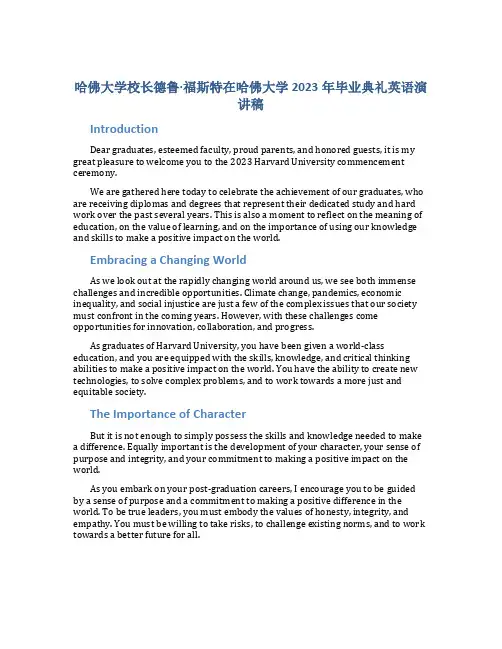
哈佛大学校长德鲁·福斯特在哈佛大学2023年毕业典礼英语演讲稿IntroductionDear graduates, esteemed faculty, proud parents, and honored guests, it is my great pleasure to welcome you to the 2023 Harvard University commencement ceremony.We are gathered here today to celebrate the achievement of our graduates, who are receiving diplomas and degrees that represent their dedicated study and hard work over the past several years. This is also a moment to reflect on the meaning of education, on the value of learning, and on the importance of using our knowledge and skills to make a positive impact on the world.Embracing a Changing WorldAs we look out at the rapidly changing world around us, we see both immense challenges and incredible opportunities. Climate change, pandemics, economic inequality, and social injustice are just a few of the complex issues that our society must confront in the coming years. However, with these challenges come opportunities for innovation, collaboration, and progress.As graduates of Harvard University, you have been given a world-class education, and you are equipped with the skills, knowledge, and critical thinking abilities to make a positive impact on the world. You have the ability to create new technologies, to solve complex problems, and to work towards a more just and equitable society.The Importance of CharacterBut it is not enough to simply possess the skills and knowledge needed to make a difference. Equally important is the development of your character, your sense of purpose and integrity, and your commitment to making a positive impact on the world.As you embark on your post-graduation careers, I encourage you to be guided by a sense of purpose and a commitment to making a positive difference in the world. To be true leaders, you must embody the values of honesty, integrity, and empathy. You must be willing to take risks, to challenge existing norms, and to work towards a better future for all.Closing ThoughtsAs you leave Harvard University today, know that you are part of a long and proud tradition of scholarship, innovation, and leadership. You are part of a community of exceptional individuals who share a commitment to making a positive impact on the world.I wish you all the best as you begin the next chapter of your lives, and I encourage you to embrace the challenges that lie ahead, to remain guided by your sense of purpose, and to always use your education and skills to make a meaningful and positive impact on the world.Congratulations, Class of 2023!。
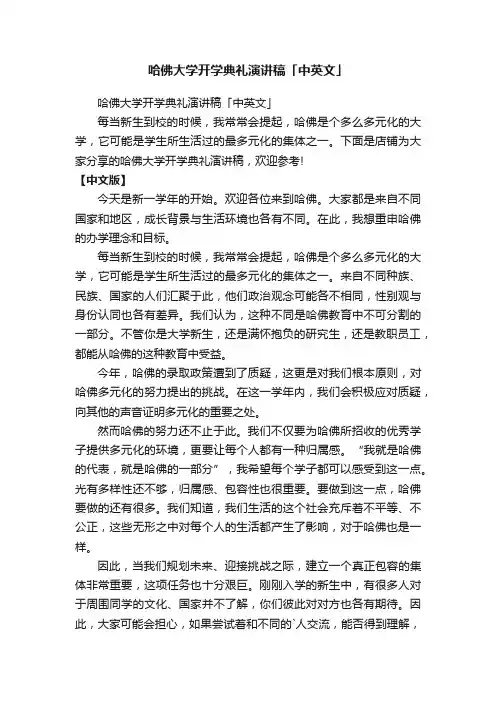
哈佛大学开学典礼演讲稿「中英文」哈佛大学开学典礼演讲稿「中英文」每当新生到校的时候,我常常会提起,哈佛是个多么多元化的大学,它可能是学生所生活过的最多元化的集体之一。
下面是店铺为大家分享的哈佛大学开学典礼演讲稿,欢迎参考!【中文版】今天是新一学年的开始。
欢迎各位来到哈佛。
大家都是来自不同国家和地区,成长背景与生活环境也各有不同。
在此,我想重申哈佛的办学理念和目标。
每当新生到校的时候,我常常会提起,哈佛是个多么多元化的大学,它可能是学生所生活过的最多元化的集体之一。
来自不同种族、民族、国家的人们汇聚于此,他们政治观念可能各不相同,性别观与身份认同也各有差异。
我们认为,这种不同是哈佛教育中不可分割的一部分。
不管你是大学新生,还是满怀抱负的研究生,还是教职员工,都能从哈佛的这种教育中受益。
今年,哈佛的录取政策遭到了质疑,这更是对我们根本原则,对哈佛多元化的努力提出的挑战。
在这一学年内,我们会积极应对质疑,向其他的声音证明多元化的重要之处。
然而哈佛的努力还不止于此。
我们不仅要为哈佛所招收的优秀学子提供多元化的环境,更要让每个人都有一种归属感。
“我就是哈佛的代表,就是哈佛的一部分”,我希望每个学子都可以感受到这一点。
光有多样性还不够,归属感、包容性也很重要。
要做到这一点,哈佛要做的还有很多。
我们知道,我们生活的这个社会充斥着不平等、不公正,这些无形之中对每个人的生活都产生了影响,对于哈佛也是一样。
因此,当我们规划未来、迎接挑战之际,建立一个真正包容的集体非常重要,这项任务也十分艰巨。
刚刚入学的新生中,有很多人对于周围同学的文化、国家并不了解,你们彼此对对方也各有期待。
因此,大家可能会担心,如果尝试着和不同的`人交流,能否得到理解,还是会被忽视、无视?如何让哈佛成为一个相互学习相互了解的集体,而非冷漠忽视?如何消除隐性歧视并从中吸取教训?如何能消除一些歧视性或者针对性的语言?如何才能让大家以治学般的严谨态度探询、理解人与人的差异?这个暑假,我和JimRyan院长谈及了这些情况,他表示,我们应该努力成为“包容的倾听者”。
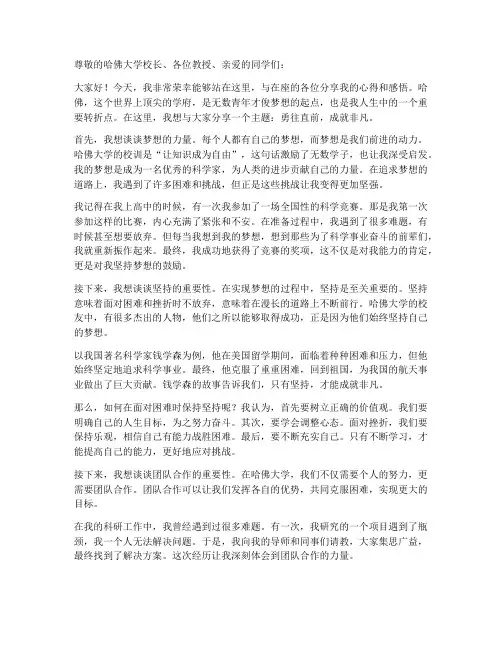
尊敬的哈佛大学校长、各位教授、亲爱的同学们:大家好!今天,我非常荣幸能够站在这里,与在座的各位分享我的心得和感悟。
哈佛,这个世界上顶尖的学府,是无数青年才俊梦想的起点,也是我人生中的一个重要转折点。
在这里,我想与大家分享一个主题:勇往直前,成就非凡。
首先,我想谈谈梦想的力量。
每个人都有自己的梦想,而梦想是我们前进的动力。
哈佛大学的校训是“让知识成为自由”,这句话激励了无数学子,也让我深受启发。
我的梦想是成为一名优秀的科学家,为人类的进步贡献自己的力量。
在追求梦想的道路上,我遇到了许多困难和挑战,但正是这些挑战让我变得更加坚强。
我记得在我上高中的时候,有一次我参加了一场全国性的科学竞赛。
那是我第一次参加这样的比赛,内心充满了紧张和不安。
在准备过程中,我遇到了很多难题,有时候甚至想要放弃。
但每当我想到我的梦想,想到那些为了科学事业奋斗的前辈们,我就重新振作起来。
最终,我成功地获得了竞赛的奖项,这不仅是对我能力的肯定,更是对我坚持梦想的鼓励。
接下来,我想谈谈坚持的重要性。
在实现梦想的过程中,坚持是至关重要的。
坚持意味着面对困难和挫折时不放弃,意味着在漫长的道路上不断前行。
哈佛大学的校友中,有很多杰出的人物,他们之所以能够取得成功,正是因为他们始终坚持自己的梦想。
以我国著名科学家钱学森为例,他在美国留学期间,面临着种种困难和压力,但他始终坚定地追求科学事业。
最终,他克服了重重困难,回到祖国,为我国的航天事业做出了巨大贡献。
钱学森的故事告诉我们,只有坚持,才能成就非凡。
那么,如何在面对困难时保持坚持呢?我认为,首先要树立正确的价值观。
我们要明确自己的人生目标,为之努力奋斗。
其次,要学会调整心态。
面对挫折,我们要保持乐观,相信自己有能力战胜困难。
最后,要不断充实自己。
只有不断学习,才能提高自己的能力,更好地应对挑战。
接下来,我想谈谈团队合作的重要性。
在哈佛大学,我们不仅需要个人的努力,更需要团队合作。
团队合作可以让我们发挥各自的优势,共同克服困难,实现更大的目标。
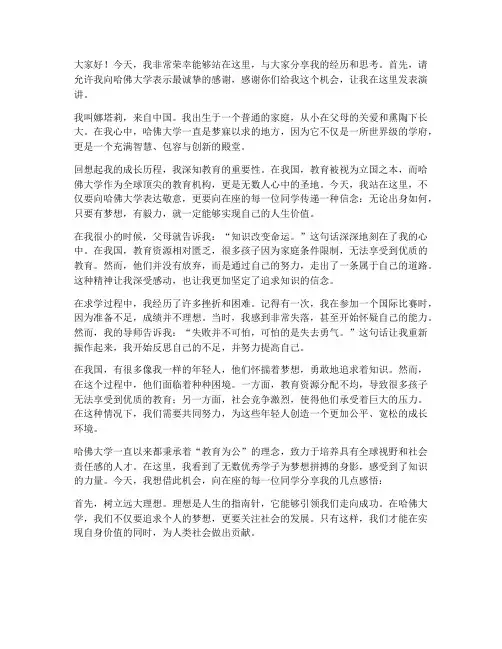
大家好!今天,我非常荣幸能够站在这里,与大家分享我的经历和思考。
首先,请允许我向哈佛大学表示最诚挚的感谢,感谢你们给我这个机会,让我在这里发表演讲。
我叫娜塔莉,来自中国。
我出生于一个普通的家庭,从小在父母的关爱和熏陶下长大。
在我心中,哈佛大学一直是梦寐以求的地方,因为它不仅是一所世界级的学府,更是一个充满智慧、包容与创新的殿堂。
回想起我的成长历程,我深知教育的重要性。
在我国,教育被视为立国之本,而哈佛大学作为全球顶尖的教育机构,更是无数人心中的圣地。
今天,我站在这里,不仅要向哈佛大学表达敬意,更要向在座的每一位同学传递一种信念:无论出身如何,只要有梦想,有毅力,就一定能够实现自己的人生价值。
在我很小的时候,父母就告诉我:“知识改变命运。
”这句话深深地刻在了我的心中。
在我国,教育资源相对匮乏,很多孩子因为家庭条件限制,无法享受到优质的教育。
然而,他们并没有放弃,而是通过自己的努力,走出了一条属于自己的道路。
这种精神让我深受感动,也让我更加坚定了追求知识的信念。
在求学过程中,我经历了许多挫折和困难。
记得有一次,我在参加一个国际比赛时,因为准备不足,成绩并不理想。
当时,我感到非常失落,甚至开始怀疑自己的能力。
然而,我的导师告诉我:“失败并不可怕,可怕的是失去勇气。
”这句话让我重新振作起来,我开始反思自己的不足,并努力提高自己。
在我国,有很多像我一样的年轻人,他们怀揣着梦想,勇敢地追求着知识。
然而,在这个过程中,他们面临着种种困境。
一方面,教育资源分配不均,导致很多孩子无法享受到优质的教育;另一方面,社会竞争激烈,使得他们承受着巨大的压力。
在这种情况下,我们需要共同努力,为这些年轻人创造一个更加公平、宽松的成长环境。
哈佛大学一直以来都秉承着“教育为公”的理念,致力于培养具有全球视野和社会责任感的人才。
在这里,我看到了无数优秀学子为梦想拼搏的身影,感受到了知识的力量。
今天,我想借此机会,向在座的每一位同学分享我的几点感悟:首先,树立远大理想。
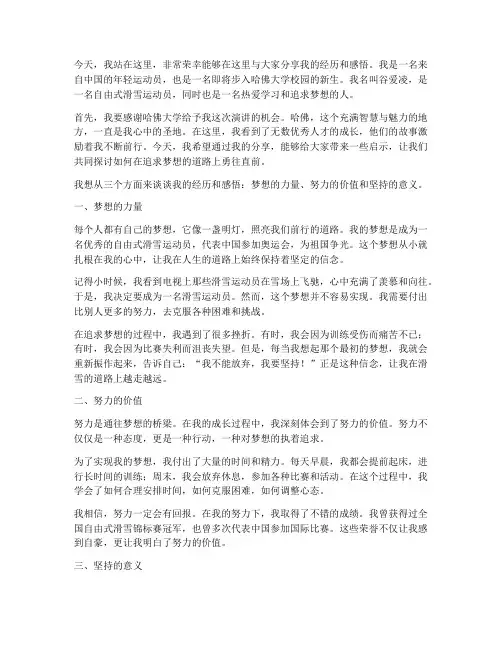
今天,我站在这里,非常荣幸能够在这里与大家分享我的经历和感悟。
我是一名来自中国的年轻运动员,也是一名即将步入哈佛大学校园的新生。
我名叫谷爱凌,是一名自由式滑雪运动员,同时也是一名热爱学习和追求梦想的人。
首先,我要感谢哈佛大学给予我这次演讲的机会。
哈佛,这个充满智慧与魅力的地方,一直是我心中的圣地。
在这里,我看到了无数优秀人才的成长,他们的故事激励着我不断前行。
今天,我希望通过我的分享,能够给大家带来一些启示,让我们共同探讨如何在追求梦想的道路上勇往直前。
我想从三个方面来谈谈我的经历和感悟:梦想的力量、努力的价值和坚持的意义。
一、梦想的力量每个人都有自己的梦想,它像一盏明灯,照亮我们前行的道路。
我的梦想是成为一名优秀的自由式滑雪运动员,代表中国参加奥运会,为祖国争光。
这个梦想从小就扎根在我的心中,让我在人生的道路上始终保持着坚定的信念。
记得小时候,我看到电视上那些滑雪运动员在雪场上飞驰,心中充满了羡慕和向往。
于是,我决定要成为一名滑雪运动员。
然而,这个梦想并不容易实现。
我需要付出比别人更多的努力,去克服各种困难和挑战。
在追求梦想的过程中,我遇到了很多挫折。
有时,我会因为训练受伤而痛苦不已;有时,我会因为比赛失利而沮丧失望。
但是,每当我想起那个最初的梦想,我就会重新振作起来,告诉自己:“我不能放弃,我要坚持!”正是这种信念,让我在滑雪的道路上越走越远。
二、努力的价值努力是通往梦想的桥梁。
在我的成长过程中,我深刻体会到了努力的价值。
努力不仅仅是一种态度,更是一种行动,一种对梦想的执着追求。
为了实现我的梦想,我付出了大量的时间和精力。
每天早晨,我都会提前起床,进行长时间的训练;周末,我会放弃休息,参加各种比赛和活动。
在这个过程中,我学会了如何合理安排时间,如何克服困难,如何调整心态。
我相信,努力一定会有回报。
在我的努力下,我取得了不错的成绩。
我曾获得过全国自由式滑雪锦标赛冠军,也曾多次代表中国参加国际比赛。
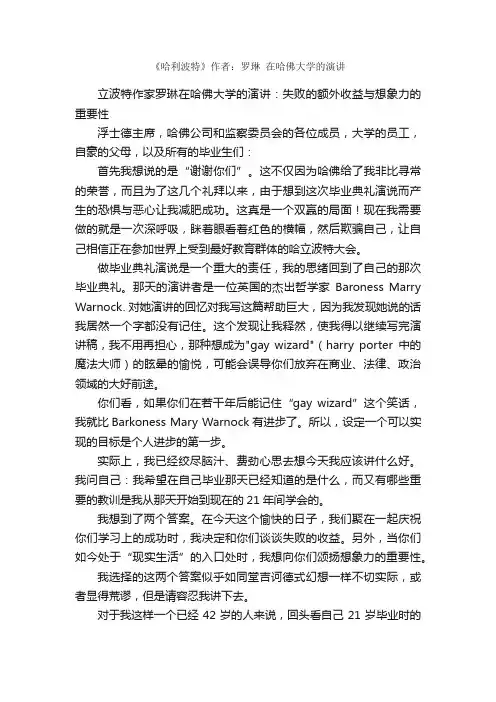
《哈利波特》作者:罗琳在哈佛大学的演讲立波特作家罗琳在哈佛大学的演讲:失败的额外收益与想象力的重要性浮士德主席,哈佛公司和监察委员会的各位成员,大学的员工,自豪的父母,以及所有的毕业生们:首先我想说的是“谢谢你们”。
这不仅因为哈佛给了我非比寻常的荣誉,而且为了这几个礼拜以来,由于想到这次毕业典礼演说而产生的恐惧与恶心让我减肥成功。
这真是一个双赢的局面!现在我需要做的就是一次深呼吸,眯着眼看着红色的横幅,然后欺骗自己,让自己相信正在参加世界上受到最好教育群体的哈立波特大会。
做毕业典礼演说是一个重大的责任,我的思绪回到了自己的那次毕业典礼。
那天的演讲者是一位英国的杰出哲学家Baroness Marry Warnock. 对她演讲的回忆对我写这篇帮助巨大,因为我发现她说的话我居然一个字都没有记住。
这个发现让我释然,使我得以继续写完演讲稿,我不用再担心,那种想成为"gay wizard"(harry porter中的魔法大师)的眩晕的愉悦,可能会误导你们放弃在商业、法律、政治领域的大好前途。
你们看,如果你们在若干年后能记住“gay wizard”这个笑话,我就比Barkoness Mary Warnock有进步了。
所以,设定一个可以实现的目标是个人进步的第一步。
实际上,我已经绞尽脑汁、费劲心思去想今天我应该讲什么好。
我问自己:我希望在自己毕业那天已经知道的是什么,而又有哪些重要的教训是我从那天开始到现在的21年间学会的。
我想到了两个答案。
在今天这个愉快的日子,我们聚在一起庆祝你们学习上的成功时,我决定和你们谈谈失败的收益。
另外,当你们如今处于“现实生活”的入口处时,我想向你们颂扬想象力的重要性。
我选择的这两个答案似乎如同堂吉诃德式幻想一样不切实际,或者显得荒谬,但是请容忍我讲下去。
对于我这样一个已经42岁的人来说,回头看自己21岁毕业时的情景,并不是一件舒服的事情。
我的前半生之前,我一直在自己内心的追求与最亲近的人对我的要求之间进行不自在的抗争。
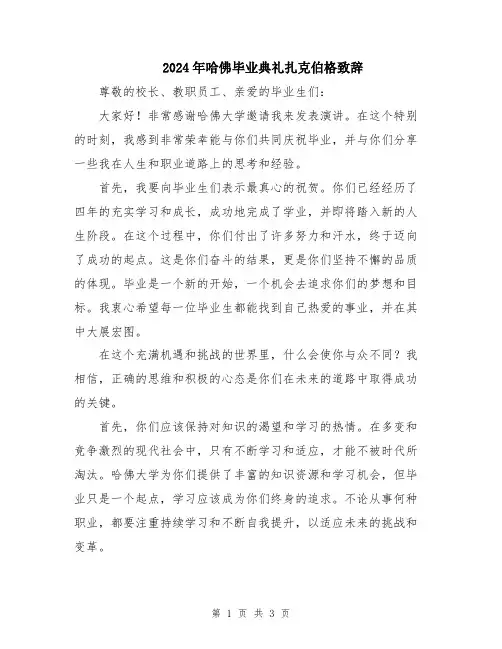
2024年哈佛毕业典礼扎克伯格致辞尊敬的校长、教职员工、亲爱的毕业生们:大家好!非常感谢哈佛大学邀请我来发表演讲。
在这个特别的时刻,我感到非常荣幸能与你们共同庆祝毕业,并与你们分享一些我在人生和职业道路上的思考和经验。
首先,我要向毕业生们表示最真心的祝贺。
你们已经经历了四年的充实学习和成长,成功地完成了学业,并即将踏入新的人生阶段。
在这个过程中,你们付出了许多努力和汗水,终于迈向了成功的起点。
这是你们奋斗的结果,更是你们坚持不懈的品质的体现。
毕业是一个新的开始,一个机会去追求你们的梦想和目标。
我衷心希望每一位毕业生都能找到自己热爱的事业,并在其中大展宏图。
在这个充满机遇和挑战的世界里,什么会使你与众不同?我相信,正确的思维和积极的心态是你们在未来的道路中取得成功的关键。
首先,你们应该保持对知识的渴望和学习的热情。
在多变和竞争激烈的现代社会中,只有不断学习和适应,才能不被时代所淘汰。
哈佛大学为你们提供了丰富的知识资源和学习机会,但毕业只是一个起点,学习应该成为你们终身的追求。
不论从事何种职业,都要注重持续学习和不断自我提升,以适应未来的挑战和变革。
其次,你们应该具备创新思维和勇于尝试的勇气。
目前的世界正在飞速发展,每天都有新技术和新思维不断涌现。
要想在这个竞争激烈的时代中脱颖而出,你们需要有独立思考和创新能力。
不要惧怕失败,只有不断尝试和学会从失败中汲取经验教训,才能真正找到成功的方向。
正如史蒂夫·乔布斯所说:“创新是区别优秀和卓越的必要条件。
”相信自己的能力,敢于冒险和突破,去寻找新的机会和可能性。
此外,你们也应该培养良好的沟通和合作能力。
在现代社会中,没有一个人可以独自完成伟大的事业。
要想实现自己的目标,你们需要与他人合作,建立强大的团队,共同面对挑战并取得成功。
与人相处需要开放和谦卑的态度,要善于倾听和尊重他人的意见。
只有通过良好的沟通和合作,你们才能够互相支持和激发彼此的潜力,共同实现更大的成就。
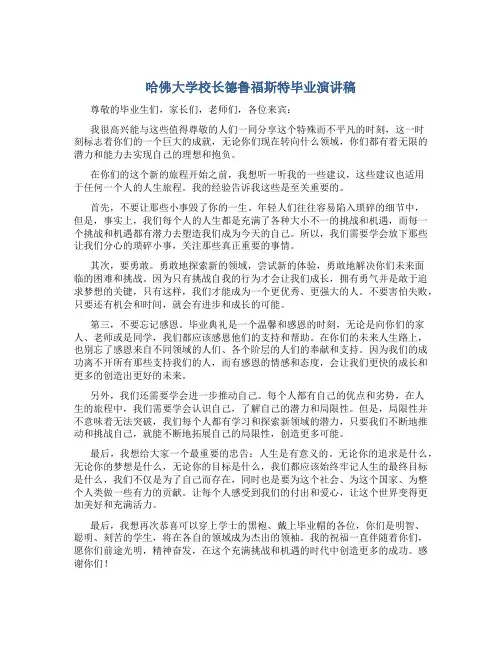
哈佛大学校长德鲁福斯特毕业演讲稿尊敬的毕业生们,家长们,老师们,各位来宾:我很高兴能与这些值得尊敬的人们一同分享这个特殊而不平凡的时刻,这一时刻标志着你们的一个巨大的成就,无论你们现在转向什么领域,你们都有着无限的潜力和能力去实现自己的理想和抱负。
在你们的这个新的旅程开始之前,我想听一听我的一些建议,这些建议也适用于任何一个人的人生旅程。
我的经验告诉我这些是至关重要的。
首先,不要让那些小事毁了你的一生。
年轻人们往往容易陷入琐碎的细节中,但是,事实上,我们每个人的人生都是充满了各种大小不一的挑战和机遇,而每一个挑战和机遇都有潜力去塑造我们成为今天的自己。
所以,我们需要学会放下那些让我们分心的琐碎小事,关注那些真正重要的事情。
其次,要勇敢。
勇敢地探索新的领域,尝试新的体验,勇敢地解决你们未来面临的困难和挑战。
因为只有挑战自我的行为才会让我们成长,拥有勇气并是敢于追求梦想的关键,只有这样,我们才能成为一个更优秀、更强大的人。
不要害怕失败,只要还有机会和时间,就会有进步和成长的可能。
第三,不要忘记感恩。
毕业典礼是一个温馨和感恩的时刻,无论是向你们的家人、老师或是同学,我们都应该感恩他们的支持和帮助。
在你们的未来人生路上,也别忘了感恩来自不同领域的人们、各个阶层的人们的奉献和支持。
因为我们的成功离不开所有那些支持我们的人,而有感恩的情感和态度,会让我们更快的成长和更多的创造出更好的未来。
另外,我们还需要学会进一步推动自己。
每个人都有自己的优点和劣势,在人生的旅程中,我们需要学会认识自己,了解自己的潜力和局限性。
但是,局限性并不意味着无法突破,我们每个人都有学习和探索新领域的潜力,只要我们不断地推动和挑战自己,就能不断地拓展自己的局限性,创造更多可能。
最后,我想给大家一个最重要的忠告:人生是有意义的。
无论你的追求是什么,无论你的梦想是什么,无论你的目标是什么,我们都应该始终牢记人生的最终目标是什么,我们不仅是为了自己而存在,同时也是要为这个社会、为这个国家、为整个人类做一些有力的贡献。
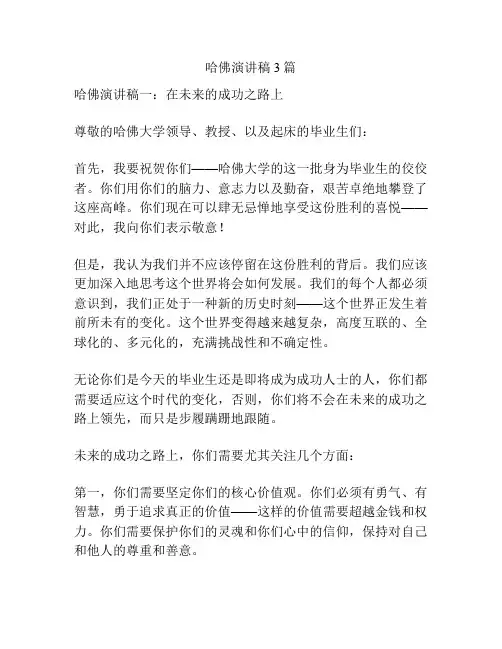
哈佛演讲稿3篇哈佛演讲稿一:在未来的成功之路上尊敬的哈佛大学领导、教授、以及起床的毕业生们:首先,我要祝贺你们——哈佛大学的这一批身为毕业生的佼佼者。
你们用你们的脑力、意志力以及勤奋,艰苦卓绝地攀登了这座高峰。
你们现在可以肆无忌惮地享受这份胜利的喜悦——对此,我向你们表示敬意!但是,我认为我们并不应该停留在这份胜利的背后。
我们应该更加深入地思考这个世界将会如何发展。
我们的每个人都必须意识到,我们正处于一种新的历史时刻——这个世界正发生着前所未有的变化。
这个世界变得越来越复杂,高度互联的、全球化的、多元化的,充满挑战性和不确定性。
无论你们是今天的毕业生还是即将成为成功人士的人,你们都需要适应这个时代的变化,否则,你们将不会在未来的成功之路上领先,而只是步履蹒跚地跟随。
未来的成功之路上,你们需要尤其关注几个方面:第一,你们需要坚定你们的核心价值观。
你们必须有勇气、有智慧,勇于追求真正的价值——这样的价值需要超越金钱和权力。
你们需要保护你们的灵魂和你们心中的信仰,保持对自己和他人的尊重和善意。
第二,你们需要投资你们的人际关系。
你们需要建立良好的人际关系——这些关系需要他人的信任和支持,以及一致的期望和愿景。
在这个网络化的时代,建立人际关系将会变得越来越重要。
第三,你们需要拥抱这个世界的多元化。
我们的世界正在越来越多元化——所以,我们需要更加包容和谅解。
你们需要了解和能够尊重不同的文化背景和观点,同时能够接纳所不同之处。
最后,我希望你们在未来的成功之路上,保持自己的信念与价值,建立良好的人际关系,以及拥抱多元化的世界。
只有这样,你们才能在未来的成功之路上更加一路平顺。
谢谢!哈佛演讲稿二:制止激进思想,建立理性社会尊敬的哈佛大学领导、教授、以及在场的各位:我们的社会近年来正经历着一场激进思想的崛起——这种思想可能是全球化的精英主义,可能是民族主义,可能是极右翼主义,或者是其他形式的极端主义。
这种激进思想可以是暴力和仇恨的源泉,它破坏了人们的信任,扭曲了事实,使人们无法在一起努力解决问题。
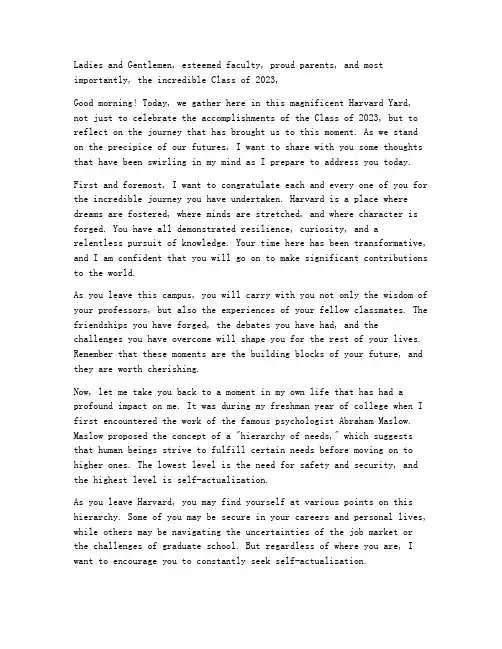
Ladies and Gentlemen, esteemed faculty, proud parents, and most importantly, the incredible Class of 2023,Good morning! Today, we gather here in this magnificent Harvard Yard, not just to celebrate the accomplishments of the Class of 2023, but to reflect on the journey that has brought us to this moment. As we stand on the precipice of our futures, I want to share with you some thoughts that have been swirling in my mind as I prepare to address you today.First and foremost, I want to congratulate each and every one of you for the incredible journey you have undertaken. Harvard is a place where dreams are fostered, where minds are stretched, and where character is forged. You have all demonstrated resilience, curiosity, and arelentless pursuit of knowledge. Your time here has been transformative, and I am confident that you will go on to make significant contributions to the world.As you leave this campus, you will carry with you not only the wisdom of your professors, but also the experiences of your fellow classmates. The friendships you have forged, the debates you have had, and the challenges you have overcome will shape you for the rest of your lives. Remember that these moments are the building blocks of your future, and they are worth cherishing.Now, let me take you back to a moment in my own life that has had a profound impact on me. It was during my freshman year of college when I first encountered the work of the famous psychologist Abraham Maslow. Maslow proposed the concept of a "hierarchy of needs," which suggests that human beings strive to fulfill certain needs before moving on to higher ones. The lowest level is the need for safety and security, and the highest level is self-actualization.As you leave Harvard, you may find yourself at various points on this hierarchy. Some of you may be secure in your careers and personal lives, while others may be navigating the uncertainties of the job market or the challenges of graduate school. But regardless of where you are, I want to encourage you to constantly seek self-actualization.Self-actualization is about embracing the unknown, about pushing the boundaries of your comfort zone, and about living a life that is authentic to who you are. It is not about the accumulation of wealth or status, but about the fulfillment of your potential and the impact you have on others.So, how do we embrace the unknown? How do we strive for self-actualization in a world that is constantly changing? Here are a few suggestions:1. Cultivate a growth mindset: Embrace challenges, be curious, and see failure as an opportunity to learn. Remember that success is not the absence of failure, but the persistence through it.2. Foster resilience: Life is unpredictable, and you will face setbacks. Develop the ability to bounce back from adversity and use those experiences as fuel for your growth.3. Seek balance: Balance your professional aspirations with your personal life. Remember that your well-being is just as important as your achievements.4. Embrace diversity: The world is a tapestry of cultures, ideas, and perspectives. Surround yourself with people who challenge you and broaden your horizons.5. Stay true to your values: In the pursuit of success, it is easy to lose sight of what truly matters to you. Stay grounded in your values and let them guide your decisions.As you embark on your post-Harvard journey, remember that the future is not a predetermined path, but a canvas upon which you will paint your own masterpiece. It is filled with possibilities, and it is up to you to create your own destiny.I want to leave you with a quote from the poet Rumi: "The only way to have a friend is to be one." As you go forth, be a friend to others. Be compassionate, be generous, and be open to the connections that will enrich your life.In closing, I want to say that you are all incredibly capable, and I have no doubt that you will achieve great things. But remember that the true measure of success is not the achievements you attain, but the impact you have on the world around you.Congratulations, Class of 2023. Go forth and make your mark on the world. The future is yours to create.Thank you.。
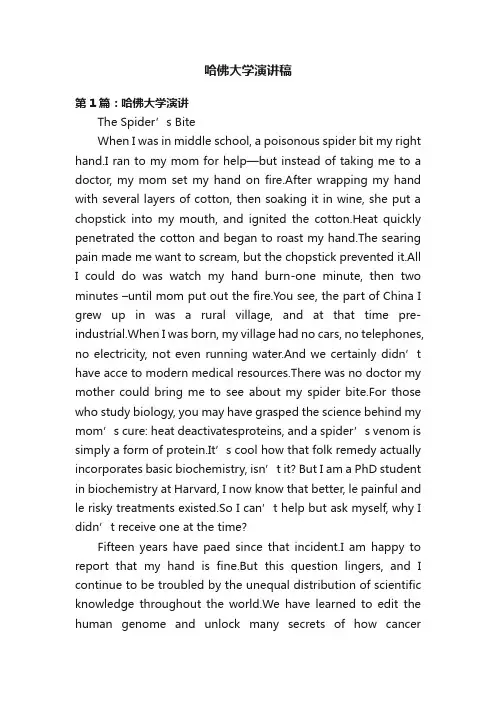
哈佛大学演讲稿第1篇:哈佛大学演讲The Spider’s BiteWhen I was in middle school, a poisonous spider bit my right hand.I ran to my mom for help—but instead of taking me to a doctor, my mom set my hand on fire.After wrapping my hand with several layers of cotton, then soaking it in wine, she put a chopstick into my mouth, and ignited the cotton.Heat quickly penetrated the cotton and began to roast my hand.The searing pain made me want to scream, but the chopstick prevented it.All I could do was watch my hand burn-one minute, then two minutes –until mom put out the fire.You see, the part of China I grew up in was a rural village, and at that time pre-industrial.When I was born, my village had no cars, no telephones, no electricity, not even running water.And we certainly didn’t have acce to modern medical resources.There was no doctor my mother could bring me to see about my spider bite.For those who study biology, you may have grasped the science behind my mom’s cure: heat deactivatesproteins, and a spider’s venom is simply a form of protein.It’s cool how that folk remedy actually incorporates basic biochemistry, isn’t it? But I am a PhD student in biochemistry at Harvard, I now know that better, le painful and le risky treatments existed.So I can’t help but ask myself, why I didn’t receive one at the time?Fifteen years have paed since that incident.I am happy to report that my hand is fine.But this question lingers, and I continue to be troubled by the unequal distribution of scientific knowledge throughout the world.We have learned to edit the human genome and unlock many secrets of how cancerprogrees.We can manipulate neuronal activity literally with the switch of a light.Each year brings more advances in biomedical research-exciting, transformative accomplishments.Yet, despite the knowledge we have amaed, we haven’t been so succeful in deploying it to where it’s needed most.According to the World Bank, twelve percent of the world’s population lives on le than $2 a day.Malnutrition kills more than 3 million children annually.Three hundred million people are afflicted by malaria globally.All over the world, we constantly see these problems of poverty, illne, and lack of resources impeding the flow of scientific information.Lifesaving knowledge we take for granted in the modern world is often unavailable in these underdeveloped regions.And in far too many places, people are still eentially trying to cure a spider bite with fire.While studying at Harvard, I saw how scientific knowledge can help others in simple, yet profound ways.The bird flu pandemic in the 2000s looked to my village like a spell cast by demons.Our folk medicine didn’t even have half-measures to offer.What’s more, farmers didn’t know the diffe rence between common cold and flu;they didn’t understand that the flu was much more lethal than the common cold.Most people were also unaware that the virus could transmit acro different animal species.So when I realized that simple hygiene practices like separating different animal species could contain the spread of the disease, and that I could help make this knowledge available to my village, that was my first “Aha” moment as a budding scientist.But it was more than that: it was also a vital inflection point in my own ethical development, my own self-understanding as a member of the global community.Harvard dares us to dream big, to aspire to change the world.Here on this Commencement Day, we areprobably thinking of grand destinations and big adventures that await us.As for me, I am also thinking of the farmers in my village.My experience here reminds me how important it is for researchers to communicate our knowledge to those who need it.Because by using the science we already have, we could probably bring my village and thousands like it into the world you and I take for granted every day.And that’s an impact every one of us can make!But the question is, will we make the effort or not?More than ever before, our society emphasizes science and innovation.But an equally important emphasis should be on distributing the knowledge we have to those whoneeded.Changing the world doesn’t mean that everyone has to find the next big thing.It can be as simple as becoming better communicators, and finding more creative ways to pa on the knowledge we have to people like my mom and the farmers in their local community.Our society also needs to recognize that the equal distribution of knowledge is a pivotal step of human development, and work to bring this into reality.And if we do that, then perhaps a teenager in rural China who is bitten by a spider will not have to burn his hand, but will know to seek a doctor instead.[I have just been to Buckingham Palace where Her Majesty the Queen has asked me to form a new government, and I accepted.[我刚去过白金汉宫,女王陛下要我组建新政府,我接受了。
比尔·盖茨在哈佛大学毕业典礼上的演讲(中英文对照)[精选5篇]第一篇:比尔·盖茨在哈佛大学毕业典礼上的演讲(中英文对照) 比尔·盖茨和夫人梅琳达·盖茨在斯坦福大学2014年毕业典礼上的演讲。
整个演讲以“乐观”为主线,强调了他们对科技的乐观态度,以及对世界美好未来的乐观态度。
盖茨夫妇轮流讲述了自己的亲身经历和故事,告诉学生应该站在他人的立场上,感同身受那些处境不及自己的人,尽自己所能去帮助那些需要帮助的人,让全世界所有人类同胞都有一样的美好未来。
Stanford University.(斯坦福大学)BILL GATES: Congratulations, class of 2014!比尔·盖茨:2014届毕业生,祝贺你们顺利毕业(Cheers).(欢呼)Melinda and I are excited to be here.It would be a thrill for anyone to be invited to speak at a Stanford commencement, but it's especially gratifying for us.Stanford is rapidly becoming the favorite university for members of our family, and it's long been a favorite university for Microsoft and our foundation.我和梅琳达怀着激动的心情与你们欢聚在此共贺毕业。
能受邀到斯坦福大学学位授予典礼上做演讲是一件让人激动的事,对我们而言,这尤为荣幸。
斯坦福大学正日渐成为我们家庭成员最喜爱的大学。
而长久以来,斯坦福也是微软以及比尔与梅琳达基金会最喜爱的一所大学。
”Our formula has been to get the smartest, most creative people working on the most important problems.It turns out that a disproportionate number of those people are at Stanford.(Cheers).我们一直致力于让最聪颖有创造力的人攻克最为重要的问题。
大家好!今天,我站在这里,非常荣幸能够与大家共同探讨一个永恒而深刻的话题——公正与公平。
在这个世界上,没有哪个国家、哪个社会能够完全摆脱公正与公平的困扰,哈佛大学作为世界顶尖的学府,更应该成为推动公正与公平的先锋。
今天,我将从以下几个方面阐述公正与公平的重要性,以及我们如何为之努力。
一、公正与公平的定义公正,是指在社会生活中,对所有人一视同仁,不偏不倚,使每个人都享有平等的权利和机会。
公平,是指在社会资源分配、权利义务等方面,确保每个人都能得到合理的待遇,实现社会各阶层之间的和谐共生。
二、公正与公平的重要性1. 公正与公平是社会稳定的基础。
一个公正公平的社会,能够让民众安居乐业,减少社会矛盾,实现国家长治久安。
2. 公正与公平是人民幸福的保障。
一个公正公平的社会,能够使每个人都能享受到公平的机会和待遇,从而实现自身价值,获得幸福感。
3. 公正与公平是推动社会进步的动力。
一个公正公平的社会,能够激发人们的创新精神,促进科技、文化、教育等领域的发展。
4. 公正与公平是国际交往的基石。
一个公正公平的国家,能够赢得国际社会的尊重和信任,为国家的和平发展创造有利条件。
三、哈佛大学在推动公正与公平方面的责任作为世界顶尖的学府,哈佛大学在推动公正与公平方面肩负着重要责任。
以下是我对哈佛大学在推动公正与公平方面的建议:1. 优化招生政策,确保录取过程公平公正。
哈佛大学应进一步完善招生政策,加大对弱势群体的扶持力度,使更多优秀学生有机会进入哈佛大学。
2. 强化学术道德教育,培养具有社会责任感的优秀人才。
哈佛大学应加强学术道德教育,培养学生尊重知识、追求真理、勇于担当的品质。
3. 积极参与社会公益事业,为公正公平的社会贡献力量。
哈佛大学应充分发挥自身优势,积极参与社会公益事业,助力贫困地区、弱势群体的发展。
4. 推动国际合作,共同应对全球性公正公平问题。
哈佛大学应加强与国际高校的合作,共同探讨解决全球性公正公平问题的途径。
尊敬的哈佛大学师生们,女士们、先生们:大家好!今天,我非常荣幸能够站在这里,与大家分享关于幸福的研究成果。
幸福,这个看似简单却深奥莫测的词汇,自古以来就一直是人类追求的目标。
而今天,我将带领大家走进哈佛大学幸福研究的殿堂,探索幸福的奥秘。
首先,让我们回顾一下哈佛大学幸福研究的历史。
早在1938年,哈佛大学就开始了一项名为“格兰特研究”的长期研究项目。
该项目追踪了数百名男性从青春期到老年期的生活,旨在揭示影响人们幸福感的因素。
经过数十年的研究,哈佛大学幸福研究为我们揭示了幸福的本质和实现幸福的方法。
一、幸福的本质1. 幸福是内心的感受幸福并非外在的物质享受,而是源自内心的感受。
心理学家研究发现,幸福感与个人的心理状态密切相关。
乐观、积极、宽容的心态有助于提升幸福感。
2. 幸福是多元化的幸福感是多元化的,包括快乐、满足、安宁等多种感受。
不同的人对幸福的定义不同,但都离不开内心的感受。
3. 幸福是动态的幸福感并非一成不变,而是随着时间和环境的变化而变化。
我们需要不断调整心态,适应环境,才能保持幸福感。
二、影响幸福的因素1. 亲情与友情亲情和友情是影响幸福感的重要因素。
研究表明,拥有良好的家庭关系和友谊,有助于提升幸福感。
2. 工作与事业工作与事业对幸福感的影响不可忽视。
一份有意义、有成就感的工作,能够给人带来幸福感。
3. 健康与运动健康是幸福的基础。
定期运动、保持良好的生活习惯,有助于提升幸福感。
4. 社会责任感具有社会责任感的人往往更加幸福。
关心他人、回馈社会,能够让人感受到成就感和幸福感。
5. 心理素质良好的心理素质是幸福的关键。
面对生活中的挫折和困难,保持乐观、积极的心态,有助于应对压力,提升幸福感。
三、实现幸福的方法1. 培养积极心态积极的心态是幸福的基础。
学会欣赏生活中的美好,关注自己的内心感受,培养乐观、宽容的心态。
2. 建立良好的人际关系与家人、朋友保持良好的关系,学会关爱他人,有助于提升幸福感。
大家好!今天,我非常荣幸能够站在这里,与大家分享一些关于励志的故事和心得。
首先,请允许我向哈佛大学表示最崇高的敬意,感谢你们为我提供了一个与世界顶尖人才交流的平台。
自古以来,哈佛大学一直被誉为“美国的摇篮”,无数杰出人才从这里走出,为世界的发展做出了巨大贡献。
今天,我站在这里,希望与大家共同探讨如何在哈佛大学这片沃土上,种下励志的种子,让它在人生的道路上生根发芽,茁壮成长。
一、立志,是成功的基石古人云:“志不立,天下无可成之事。
”立志,是人生的第一步,也是至关重要的一步。
哈佛大学的校训“让智慧成为信仰”,正是对立志的高度概括。
在这里,我们要明确自己的人生目标,树立远大的志向。
首先,立志要明确。
我们要根据自己的兴趣、特长和时代需求,找到自己的人生方向。
正如美国前总统肯尼迪所说:“不要问你的国家能为你做些什么,而要问你能为你的国家做些什么。
”明确自己的志向,才能在人生的道路上坚定不移地前行。
其次,立志要坚定。
在追求梦想的过程中,我们会遇到各种困难和挫折。
此时,我们要保持坚定的信念,勇往直前。
正如哈佛大学校长陆登庭所说:“成功的人,不是没有遇到过挫折,而是他们在挫折面前,始终保持着坚定的信念。
”坚定信念,才能战胜一切困难。
二、勤奋,是成功的阶梯“勤能补拙是良训,一分辛苦一分才。
”勤奋,是通往成功的必经之路。
在哈佛大学,我们不仅要努力学习,还要积极参与各种实践活动,锻炼自己的能力。
首先,勤奋要刻苦。
哈佛大学的学子们,都深知刻苦学习的重要性。
在课堂上,我们要认真听讲,积极思考;在课下,我们要主动请教,深入研究。
只有刻苦学习,才能在知识的海洋中遨游。
其次,勤奋要全面。
哈佛大学注重学生的全面发展,不仅要学好专业知识,还要锻炼自己的综合素质。
我们要积极参加社团活动,培养自己的领导力、团队协作能力和创新精神。
三、坚持,是成功的保障“千里之行,始于足下。
”成功并非一蹴而就,而是需要我们持之以恒地努力。
在哈佛大学,我们要学会坚持,才能在人生的道路上走得更远。
哈佛大学毕业演讲稿(9篇)哈佛大学毕业演讲稿篇二哈佛大学毕业演讲稿篇五同学们:我作为教师代表,热忱欢送你们来到北京中医药大学求学!我先来讲一个故事。
据三国志记载,华佗医术高超,曹操的顽固性头痛病只有经华佗治疗才能有效缓解。
因此,曹操留华佗随军当军医。
但是华佗想家,对曹操谎称“方得家书,去去就回。
”回到家以后,又借口说太太病了,需要在家治疗和照看,一再续假不归。
曹操屡次写信催他回来,还让地方政府行政长官带信做思想工作,但华佗持才不买账,就是不回军队。
曹操大怒,派人前去勘探虚实。
曹操说了:“假如华佗夫人真病了,赏40斛小豆慰问之,并宽限他的假期照看妻子;如若说谎,就把华佗押送回来。
”曹操要处死华佗,大臣荀彧劝道:“华佗治病救人医术好生了得,应当宽宥。
”曹操不听,结果把华佗给杀了。
华佗死了以后,曹操头痛病又发作,曹操说:“华佗能断病根而有意不断,以此挟制自重,即使我不杀他,他也不会为我治疗断根的。
”后来曹操的爱子曹冲得病死了,曹操叹曰:“吾悔杀华佗,令此儿强死也。
”这个故事大家耳熟能详,对此史实有多种解读和看法。
不知在座诸位怎么对待这一历史大事?先请诸位一边在脑中整理一下自已的思绪,一边且听我连续说下去。
看法之一:曹操杀死神医华佗,说明他是一个“宁负天下人”、淫威残忍的奸臣枭雄。
看法之二:曹操本是一位爱才惜才敬才的将领,事实上也很敬重华佗,杀死华佗肯定有其不得已的缘由。
或许在曹操看来,你华佗作为一名军医,当守军法纪律,自由散漫离开军队,好言相劝、一再催之,不理不睬,恃才无恐,岂非视军法为儿戏?曹操杀了华佗是依法治军的需要。
看法之三:华佗说谎不诚恳的人品有问题才招致杀身之祸。
他先是谎称家中来信,说什么去去就回;后又谎称妻子生病需要照看。
即使在今日看来,人品还是讲究德艺双馨,甚至实行“德才兼备、以德为先、德高于才”的用人、培育人的原则,这与曹操当年的用人组织路线并无丝毫差异。
就说当前反腐败,也不会由于贪官能干、曾为地方建立作出奉献而被饶恕。
Oh my goodness! I‟m at Harvard! Wow! To President Faust, my fellow honorans, Carl [Muller] that was so beautiful, thank you so much, and James Rothenberg, Stephanie Wilson, Harvard faculty, with a special bow to my friend Dr. Henry Lewis Gates. All of you alumni, with a special bow to the Class of ‟88, your hundred fifteen million dollars. And to you, members of the Harvard class of 2013! Hello!我的天啊!我在哈...佛!真的!尊敬的Faust校长、和我一起获得荣誉学位的各位,Carl(注:Carl Muller哈佛校友会主席),真是太棒了,谢谢你们!还有James Rothenberg, Stephanie Wilson和哈佛的教职工们,特别感谢我的朋友Henry Lewis Gates博士(注:美国知名黑人教授)!感谢所有的哈佛校友,特别要感谢88届的毕业生,你们为哈佛捐出一亿一千五百万美元(注:哈佛历史上最多的一次同一班次校友捐款)。
所有2013届的各位毕业生们!大家好!I thank you for allowing me to be a part of the conclusion of this chapter of your lives and the commencement of your next chapter. To say that I‟m honored doesn‟t even begin to quantify the depth of gratitude that really accompanies an honorary doctorate from Harvard. Not too many little girls from rural Mississippi have made it all the way here to Cambridge. And I can tell you that I consider today as I sat on the stage this morning getting teary for you all and then teary for myself, I consider today a defining milestone in a very long and a blessed journey. My one hope today is that I can be a source of some inspiration. I‟m going to address my remarks to anybody who has ever felt inferior or felt disadvantaged, felt screwed by life, this is a speech for the Quad.感谢你们让我成为你们人生这一篇章的结束与下一篇章开始的纽带。
The Spider’s BiteWhen I was in middle school, a poisonous spider bit my right hand. I ran to my mom for help—but instead of taking me to a doctor, my mom set my hand on fire.After wrapping my hand with several layers of cotton, then soaking it in wine, she put a chopstick into my mouth, and ignited the cotton. Heat quickly penetrated the cotton and began to roast my hand. The searing pain made me want to scream, but the chopstick prevented it. All I could do was watch my hand burn - one minute, then two minutes –until mom put out the fire.You see, the part of China I grew up in was a rural village, and at that time pre-industrial. When I was born, my village had no cars, no telephones, no electricity, not even running water. And we certainly didn’t have access to modern medical resources. There was no doctor my mother could bring me to see about my spider bite.For those who study biology, you may have grasped the science behind my mom’s cure: heat deactivatesproteins, and a spider’s venom is simply a form of protein. It’s cool how that folk remedy actuallyincorporates basic biochemistry, isn’t it? But I am a PhD student in biochemistry at Harvard, I now know that better, less painful and less risky treatments existed. So I can’t help but ask myself, why I didn’t receive one at the time?Fifteen years have passed since that incident. I am happy to report that my hand is fine. But this question lingers, and I continue to be troubled by the unequal distribution of scientific knowledge throughout the world. We have learned to edit the human genome and unlock many secrets of how cancer progresses. We can manipulate neuronal activity literally with the switch of a light. Each year brings more advances in biomedical research-exciting, transformative accomplishments. Yet, despite the knowledge we have amassed, we haven’t been so successful in deploying it to where it’s needed most. According to the World Bank, twelve percent of the world’s population lives on less than $2 a day. Malnutrition kills more than 3 million children annually. Three hundred million people are afflicted by malaria globally. All over the world, we constantly see these problems of poverty, illness, and lack of resources impeding the flow of scientific information. Lifesaving knowledge we take for granted in the modern world is often unavailable in these underdeveloped regions. And in far too many places, people are still essentially trying to cure a spider bite with fire.While studying at Harvard, I saw how scientific knowledge can help others in simple, yet profound ways. The bird flu pandemic in the 2000s looked to my village like a spell cast by demons. Our folk medicine didn’t even have half-measures to offer. What’s more, farmers didn’t know the difference between common cold and flu; they didn’t understand that the flu was much more lethal than the common cold. Most people were also unaware that the virus could transmit across different animal species.So when I realized that simple hygiene practices like separating different animal species could contain the spread of the disease, and that I could help make this knowledge available to my village, that was my first “Aha”moment as a budding scientist. But it was more than that: it was also a vital inflection point in my own ethical development, my own self-understanding as a member of the global community.Harvard dares us to dream big, to aspire to change the world. Here on this Commencement Day, we are probably thinking of grand destinations and big adventures that await us. As for me, I am also thinking of the farmers in my village. My experience here reminds me how important it is for researchers to communicate our knowledge to those who need it.Because by using the science we already have, we could probably bring my village and thousands like it into the world you and I take for granted every day. And that’s an impact every one of us can make!But the question is, will we make the effort or not?More than ever before, our society emphasizes science and innovation. But an equally important emphasis should be on distributing the knowledge we have to those whoneeded. Changing the world doesn’t mean that everyone has to find the next big thing. It can be as simple as becoming better communicators, and finding more creative ways to pass on the knowledge we have to people like my mom and the farmers in their local community. Our society also needs to recognize that the equal distribution of knowledge is a pivotal step of human development, and work to bring this into reality.And if we do that, then perhaps a teenager in rural China who is bitten by a spider will not have to burn his hand, but will know to seek a doctor instead.[I have just been to Buckingham Palace where Her Majesty the Queen has asked me to form a new government, and I accepted.[我刚去过白金汉宫,女王陛下要我组建新政府,我接受了。